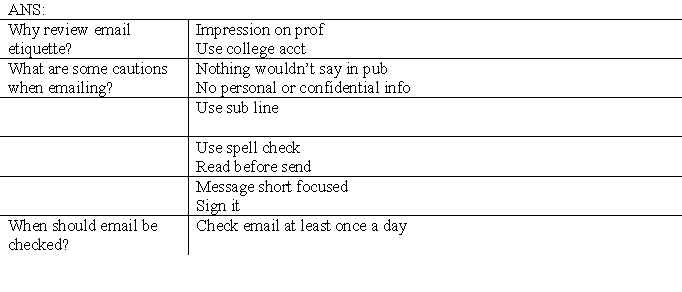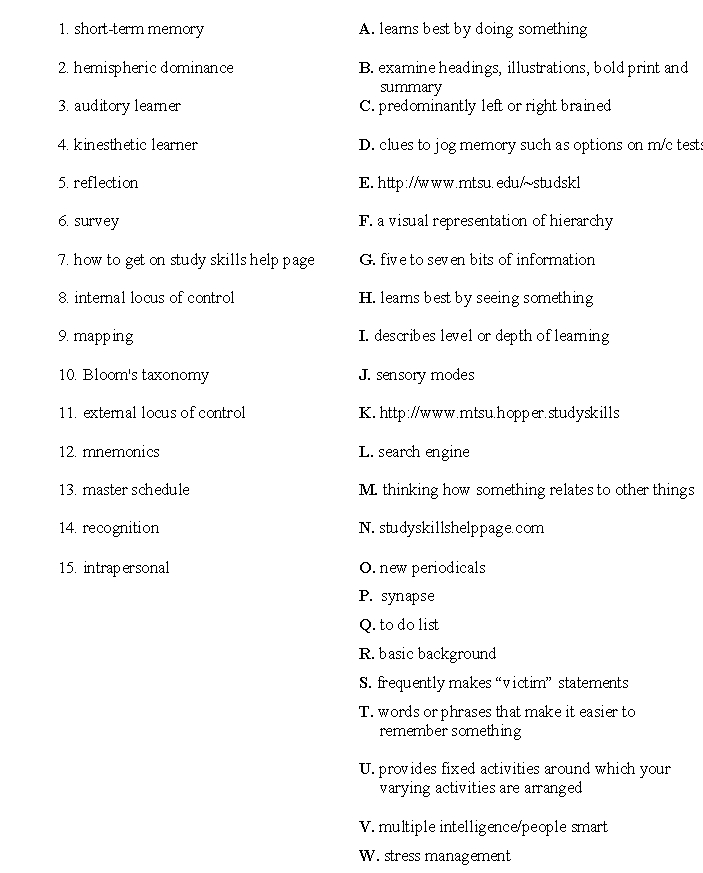Deck 6: Information Literacy
Question
Question
Question
Question
Question
Question
Question
Question
Question
Question
Question
Question
Question
Question
Question
Question
Question
Question
Question
Question
Question
Question
Question

Unlock Deck
Sign up to unlock the cards in this deck!
Unlock Deck
Unlock Deck
1/23
Play
Full screen (f)
Deck 6: Information Literacy
1
Assertive people take up for themselves while respecting the rights of others.
True
2
When registering for a new semester, you should take into consideration that for every hour in class you will probably need to plan for at least
A) 5 hours of study out of class.
B) 3 hours of study out of class.
C) 15 minutes between classes .
D) 2 hours of study out of class.
A) 5 hours of study out of class.
B) 3 hours of study out of class.
C) 15 minutes between classes .
D) 2 hours of study out of class.
D
3
Question-in-the-Margin Notes: Read the following passage. Pretend that I am giving this as a lecture. On the next page illustrate how you would take notes according to the Question-in-the-Margin system. By doing this you have illustrated the first two steps of the question in the margin system, Record and Question. In the spaces provided at the bottom of the passage, explain the remaining 4 steps.
Before you begin a new semester you should probably review your email etiquette. The impression you make on your instructors is important and often the first impression is an email from you. For emailing your instructors you should use your college account.
Don't write anything in your email you wouldn't say in public. Anyone can easily forward your message, even when done accidentally. This could leave you in an embarrassing position if you divulge personal or confidential information. If you don't want to potentially share something you write, consider using the telephone. Use Subject Line to summarize the text of your message. With so much spam (junk email), your message will likely be deleted without being read if you don't put a subject. And be sure to use a Spell checker before you send. This is an option on most email servers. Email, like conversation, tends to be sloppier than communication on paper. That's OK, but even with email you don't want to appear excessively careless. Read the email before you send it.
Keep your message short and focused. Include your name at the bottom of the message. The message contains your e-mail address (in the header), but the many times the header may show only the user name and the recipient will not know who the message is from unless you "sign" your email. If you are sending it to your instructor, it's a good idea to identify the class you are in. (Use the HELP section to create a signature block if you wish, but here I simply mean include your name.) You should check your Email at least once a day. Answer pertinent emails as soon as possible. Email is an important tool for communication. Make sure you are using it to your advantage.

Don't write anything in your email you wouldn't say in public. Anyone can easily forward your message, even when done accidentally. This could leave you in an embarrassing position if you divulge personal or confidential information. If you don't want to potentially share something you write, consider using the telephone. Use Subject Line to summarize the text of your message. With so much spam (junk email), your message will likely be deleted without being read if you don't put a subject. And be sure to use a Spell checker before you send. This is an option on most email servers. Email, like conversation, tends to be sloppier than communication on paper. That's OK, but even with email you don't want to appear excessively careless. Read the email before you send it.
Keep your message short and focused. Include your name at the bottom of the message. The message contains your e-mail address (in the header), but the many times the header may show only the user name and the recipient will not know who the message is from unless you "sign" your email. If you are sending it to your instructor, it's a good idea to identify the class you are in. (Use the HELP section to create a signature block if you wish, but here I simply mean include your name.) You should check your Email at least once a day. Answer pertinent emails as soon as possible. Email is an important tool for communication. Make sure you are using it to your advantage.

4
T/F statements tend to be false when they state a reason.

Unlock Deck
Unlock for access to all 23 flashcards in this deck.
Unlock Deck
k this deck
5
A question that contains the word never is always false.

Unlock Deck
Unlock for access to all 23 flashcards in this deck.
Unlock Deck
k this deck
6
You should preview the test and read directions carefully before you begin a timed test.

Unlock Deck
Unlock for access to all 23 flashcards in this deck.
Unlock Deck
k this deck
7
When taking class notes, it is important to spell all words correctly.

Unlock Deck
Unlock for access to all 23 flashcards in this deck.
Unlock Deck
k this deck
8
The question-in-the-margin method should be used in all reading.

Unlock Deck
Unlock for access to all 23 flashcards in this deck.
Unlock Deck
k this deck
9
John was assigned to read a chapter in his psychology textbook. He should begin his assignment by
A) reading the chapter's introduction, headings and summary and examining the graphic material in it.
B) waiting until after the lecture so he will know what's important to the professor.
C) underlining the information that he eventually wants in his notes.
D) turning to the first page of the chapter and reading through in one sitting.
A) reading the chapter's introduction, headings and summary and examining the graphic material in it.
B) waiting until after the lecture so he will know what's important to the professor.
C) underlining the information that he eventually wants in his notes.
D) turning to the first page of the chapter and reading through in one sitting.

Unlock Deck
Unlock for access to all 23 flashcards in this deck.
Unlock Deck
k this deck
10
The highest level on Bloom's taxonomy is comprehension.

Unlock Deck
Unlock for access to all 23 flashcards in this deck.
Unlock Deck
k this deck
11
Dr. James Zull says that students should memorize as much material as they canmemorize, mobilize and manipulate new informationmove toward becoming more visualmove from being receivers of knowledge to producers of knowledge.

Unlock Deck
Unlock for access to all 23 flashcards in this deck.
Unlock Deck
k this deck
12
Stress can make you physically ill.

Unlock Deck
Unlock for access to all 23 flashcards in this deck.
Unlock Deck
k this deck
13
The multiple choice option "all of the above" is always the correct response.

Unlock Deck
Unlock for access to all 23 flashcards in this deck.
Unlock Deck
k this deck
14
It is better to process analytically than globally.

Unlock Deck
Unlock for access to all 23 flashcards in this deck.
Unlock Deck
k this deck
15
You have recorded information and then written a question it in the recall (cue) column. Now, list and explain the remaining four steps.

Unlock Deck
Unlock for access to all 23 flashcards in this deck.
Unlock Deck
k this deck
16
You should answer test questions in the order you come to them.

Unlock Deck
Unlock for access to all 23 flashcards in this deck.
Unlock Deck
k this deck
17
Most true/false tests contain more true statements than false ones.

Unlock Deck
Unlock for access to all 23 flashcards in this deck.
Unlock Deck
k this deck
18
The most effective time to study for a lecture class is
A) after class.
B) before class.
C) right before you go to bed.
D) not necessary to study for this type of class.
A) after class.
B) before class.
C) right before you go to bed.
D) not necessary to study for this type of class.

Unlock Deck
Unlock for access to all 23 flashcards in this deck.
Unlock Deck
k this deck
19
When writing the answer to an essay question you should
A) plan major points.
B) have a strong thesis statement.
C) support major points.
D) all of the above.
A) plan major points.
B) have a strong thesis statement.
C) support major points.
D) all of the above.

Unlock Deck
Unlock for access to all 23 flashcards in this deck.
Unlock Deck
k this deck
20
Examples of negatives are no, never, always, and only.

Unlock Deck
Unlock for access to all 23 flashcards in this deck.
Unlock Deck
k this deck
21
Matching: Carefully read both lists below. Choose the item in the right column which best describes each item in the left column 


Unlock Deck
Unlock for access to all 23 flashcards in this deck.
Unlock Deck
k this deck
22
Review- as soon as possible after you take your notes then before you go to next class period-then
periodically.
periodically.

Unlock Deck
Unlock for access to all 23 flashcards in this deck.
Unlock Deck
k this deck
23
List the six steps for a systematic approach to research.

Unlock Deck
Unlock for access to all 23 flashcards in this deck.
Unlock Deck
k this deck


